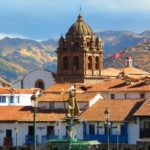Knowing When it’s Time to Go Home


Having traveled, I now have a lot more faith in my ability to conquer challenges. Some challenges are just trouble in disguise and it’s okay to turn around and realize “this isn’t a battle I care to fight.”
When I got sick in Thailand in May, it led to surgery in June, and a botched procedure in July. In retrospect, I should have gone home. Yet I don’t regret staying in Thailand because I was able to do a lot more things I wanted to, in and around the country in the remaining months I stayed. But it was still dumb.
I didn’t have to experience being sick for five months. I did it because I insisted on leaving on my own terms and ending on a good note. To me, the chapter wasn’t over and I wasn’t going to leave it open-ended because I didn’t know when I’d be able to return and finish what I’d started. That’s bullheadedness, not determination or intelligence.
Knowing When it’s Time to Go Home.
A few months later, when I set off for my trip to backpack through South America, I had every intention of staying a month in Chile and a month in Peru, in order to try to learn Spanish and to get a job that either involved cooking or working with horses, my two biggest passions.
After lots of itinerary changes, three countries, and five weeks in Peru, I set off for Chile. I spent time in Cusco volunteering in a cafe that donated all of their proceeds to building schools for children and buying supplies for them. Leaving Peru, I was ready to take on all that I’d set out to do this trip.
After about seventeen hours on buses, we were an hour and half away from our first Chilean destination, and maybe forty minutes from the border, when an 8.2 earthquake hit. Our bus had broken down on our way to Tacna, the last town on the Peruvian border. We stayed on the side of the road in the middle of Andean dessert for nearly two hours before another bus came to pick us up.
This delay put us behind schedule just enough that we missed being on the Chilean beach town of Arica, when the earthquake hit it with a tsunami following. Not knowing this, we arrived in Tacna after dark and asked a few people on the bus if it was safe to cross the border. They told us of the devastating earthquake and that the roads into Chile through the north were now demolished and inaccessible.
Knowing When it’s Time to Go Home.
We took a local’s hotel recommendation and got a taxi ride over. When we arrived, we realized the entire town had lost power from the earthquake, as the hotel had no lights and the reception staff greeted us with candles. Trying to get settled for the night we felt about six aftershocks over the next few hours.
We tried to think of all our options to get into Chile, as the northern bus route was out of the question. We had only two:
Option 1: Go back up to Lima and fly into Santiago for just under $1,000, which was our entire budget for the month.
Option 2: Go down through Bolivia and Argentina and go in through the eastern border. We considered the facts that both countries charged visa fees of about $150 for US citizens plus the extra money and time it would take to get down there. There was the option as well to forget Chile altogether and just travel Bolivia, but we’d come for Chile.
After hours and hours of research, it dawned on me that we were going home. We’d explored all of our options and sat through one aftershock after another. Missing the earthquake by an hour or so due to the bus breakdown, we decided it would be in our best interest to stop pushing our luck. The turn around was in less than twenty-four hours from when the earthquake hit to when we flew to Lima the next afternoon. They had expected more quakes to follow and put up a tsunami warning up for the entire west coast of South America.
I was upset and disappointed having to cut the trip nearly a month short, but I didn’t feel like I was giving up in any way. I felt like what happened was already written and I didn’t have a say in the matter. Tears came eventually, but at that point I’d been living out of suitcases and bags, sleeping in strange beds, and doing odd jobs for almost six months and the truth is I was tired. I probably needed to go “home,” whatever that meant.
Once we had made the decision to go home, we switched from travel to vacation mode. Our tight budget for the month turned into a big budget for our last night in Lima. We booked a five-star hotel with a rooftop pool that gave out complementary Pisco Sours and spent the next day tanning, shopping, and binge eating. It was a good last day of our trip.
Sometimes it’s okay to pack up your bags and head home. The world will still be there for you when you’re ready to head back out again. On the flip side, if you’re stuck at home in a rut, don’t hesitate to pack your bags and head out either. Luckily, the door swings both ways.








